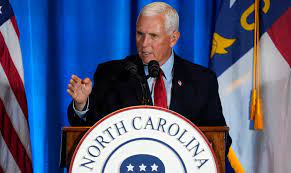Yossi Mekelberg
There is a long way to go before the first ballot is cast in the US presidential election in November 2024. Nevertheless, it is already full steam ahead for both the main parties as the Democrats and, especially, the Republicans select their candidates for the nationwide poll that will decide who leads this mighty country for the next four years.
When the dust has settled and the respective candidates are chosen, the most likely outcome seems to be a rematch between incumbent President Joe Biden and his predecessor, Donald Trump. All things considered, who could have imagined this turn of events in the aftermath of the 2020 election?
When we consider US elections it would be foolish at this early stage to attempt to predict either the result of the presidential primaries or who the next occupant of the White House will be. History has taught us that major upsets can and do happen, and when the field of candidates is rather crowded, as is the case with the Republicans, and the long, sharp knives are already out, anything could happen in the coming months.
It might seem like not a day goes by without another Republican hopeful throwing their hat into the ring. Most recently it was Mike Pence, former vice president under Trump, whose candidacy threatened to turn an already inflamed situation into an explosive one, which was followed by an announcement from the former governor of New Jersey, Chris Christie.
There are some elements of this particular presidential race that make it even more unpredictable than usual. One is the age factor, which cannot be ignored considering that the incumbent will be nearly 82 years old in November 2024, and the person he is most likely to face will be 78.
In a recent NBC News poll, 70 percent of those surveyed said Biden should not run again due to his age, although a majority of Democrats supported his candidacy. Asked whether age was a factor, 69 percent said yes.
The second issue, one which casts doubt on Trump’s candidacy, is the legal woes he faces wherever he goes. It is astonishing that following a court ruling in a civil suit that found Trump had sexually abused the journalist E. Jean Carroll in a New York department store changing room 27 years ago, a ruling that for the first time in history branded a former US president a sexual predator, that he is still regarded as a fit candidate to run for the highest office in the land by the vast majority of Republican primary voters.
This is as much a reflection of American society as it is of Trump himself. Yet, given that Trump will have to deal with a number of other legal battles before the next election, this support might yet dwindle or be surpassed by the legal implications of those cases.
There is a real danger that while the US is facing one of its most challenging periods, domestically and internationally, the primaries and the subsequent election campaign will turn into the kind of media circus that is inevitable when Trump is involved, and therefore distract from the country’s priorities.
Barring any unforeseen circumstances, however, we can be fairly certain Biden will be running for reelection, and so all eyes will also be on his running mate, Kamala Harris.
Many voters who are considering voting for Biden would not, under normal circumstances, be too concerned about whoever is running for vice president. On this occasion, however, considering the incumbent’s age and Harris being the most likely to take over should the president be incapacitated, those voters might give serious thought to her suitability for the top job.
There is also a strength in continuity, and the current administration has done a much better job in running the country’s affairs than approval ratings give it credit for. Under difficult circumstances it managed to steady a very rocky ship after the tumultuous four years of Trump’s term, led the country out of the COVID-19 pandemic, stood up to Russia over the war in Ukraine, and changed budgetary priorities with considerable success.
On the Republican side, notwithstanding the large number of presidential wannabes, the agenda is still being dictated by Trump and his caprices. A party that once prided itself on providing a big tent that could house a wide range of opinions has been rapidly shrinking and lurching further and further to the populist right as it turns into a cauldron of chaos.
While voters have been expressing their concerns about a wide range of issues, the two leading Republican contenders, Trump and Florida Gov. Ron DeSantis, who are not so far apart in terms of their political and social views, are, despite or maybe because of this, already concentrating on their respective smear campaigns and the more emotive aspects of campaigning than on substantive issues.
For now, Trump continues to rally his core supporters, who instead of acknowledging his failings view criticism of him as part of a conspiracy by the state and his political rivals. Consequently, he continues to command the support of about half of the party, nearly double that of DeSantis. Meanwhile, Pence and Nikki Haley, a former US ambassador to the UN, enjoy only single-digit support, with the rest of the field trailing even further behind.
For now, a Trump candidacy looks like a done deal but, as noted, there is a very long way to go. The inquiry into the Jan. 6, 2021, attack on the Capitol, his indictment on charges of falsifying his accounts in connection with hush money paid to an adult film star, the investigation in Georgia into whether he acted illegally in an attempt to overturn his defeat in the state’s 2020 presidential vote, and his improper retention of classified government documents at his Florida home could all land him in hot water and prevent him from running for president.
Inevitably, this is encouraging the other contenders, including those who previously worked for him, to remain in the race and add fuel to the fire of the various investigations through more information and allegations.
At this early stage, DeSantis is probably making a mistake by trying to out-Trump Trump in terms of disruption, but he also makes Trump look more liberal in comparison on issues such as freedom of speech or abortion — which is a very dubious achievement. But this might be simply a tactical move, considering his young age, designed to position him as Trump’s heir apparent for the 2028 election.
From the perspective of the Democrats, the work might be done for them should the Republican primaries turn into a bloodbath while they themselves build on their better-than-expected mid-term successes and hope that, come November next year, the seeds of policies they planted at the beginning of the Biden presidency will yield convincing enough fruit before the American people make their final decision.
One thing is guaranteed, though: This coming cycle of elections, from the presidential vote to the last of the gubernatorials, is unlikely to be a shining example of the civility and constructiveness of democratic debate.







